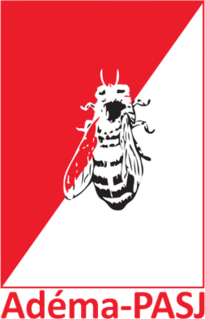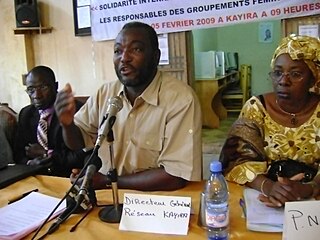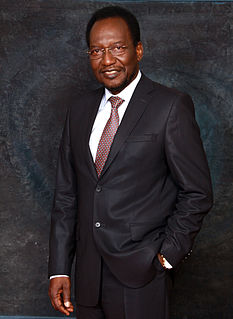Related Research Articles
Ahmed Mohamed ag Hamani was the prime minister of Mali from 2002 to 2004.
Ousmane Issoufi Maïga was the Prime Minister of Mali from 2004 to 2007. Issoufi had previously held several ministerial posts in previous governments.
Paul Mba Abessole is a Gabonese politician who heads the National Woodcutters' Rally – Rally for Gabon and was a leading opponent of President Omar Bongo during the 1990s. He stood as a presidential candidate twice during the 1990s and also served as Mayor of Libreville, the capital. From 2002 to 2009 he served in the government of Gabon, holding the rank of Deputy Prime Minister for most of that period.

Ibrahim Boubacar Keïta, often known by his initials IBK, is a Malian politician who served as the president of Mali from September 2013 to August 2020, when he was forced to resign in the 2020 Malian coup d'état. He served as Mali's prime minister from February 1994 to February 2000 and as president of the National Assembly of Mali from September 2002 to September 2007.
The National Congress for Democratic Initiative is a political party in Mali, founded in 1990 and led by Mountaga Tall.

Tiébilé Dramé is a Malian politician who served in the government of Mali as Minister of Foreign Affairs from 1991 to 1992. In the years since, he has remained active on the political scene, while also acting as a diplomat and mediator in regional crises.

The Rally for Mali is a Malian political party created by Ibrahim Boubacar Keïta in June 2001. In 2013, Keita was elected President of Mali following several unsuccessful attempts, and the party took first place in parliamentary elections, winning 66 seats, although not enough for a majority.

The Alliance for Democracy in Mali – Pan-African Party for Liberty, Solidarity and Justice is a political party in Mali.

The Party for National Rebirth is a Malian political party, created in 1995 by activists from the National Congress for Democratic Initiative (CNID). The Party for National Rebirth is headed by Tiébilé Dramé, who ran for the presidency in 2002, gaining 4% of the votes, coming in fourth place. In February 2007, he was again nominated as the party's presidential candidate for the April 2007 presidential election, receiving third place and 3.04% of the vote.

African Solidarity for Democracy and Independence is a far-left political party in Mali. It was founded by Cheick Oumar Sissoko and Oumar Mariko in 1996; Sissoko is the party's President and Mariko is its Secretary-General, the top post in the party. The party is Pan-Africanist in ideology, is affiliated internationally with the International Communist Seminar, a grouping organised by the Workers Party of Belgium, and is in part an outgrowth of the 1991 demonstrations against the military rule of President Moussa Traoré. Mariko was head of the Association of Students and Pupils of Mali (AEEM) during the 1991 protest movement which overthrew the government.

Parliamentary elections were held in Mali on 1 July 2007, with a second round on 22 July. In the first round, there were about 1,400 candidates for 147 seats in the National Assembly.
Younoussi Touré is a Malian politician. He was Prime Minister of Mali from 9 June 1992 to 12 April 1993 and was the first Prime Minister appointed under President Alpha Oumar Konaré. Touré was the President of the Union for the Republic and Democracy (URD), a political party, from 2003 to 2014. He was First Vice-President of the National Assembly from 2007 to 2012 and President of the National Assembly from 2012 to 2013.

Oumar Mariko is a Malian politician, doctor and noted former student activist. He is the Secretary-General of African Solidarity for Democracy and Independence (SADI), a left-wing political party, and has three times run for President of Mali, in 2002, 2007 and 2013.
Mamadou Lamine Traoré was a Malian politician and President of the Movement for the Independence, Renaissance, and Integration of Africa (MIRIA) political party.

Dioncounda Traoré is a Malian politician who was President of Mali in an interim capacity from April 2012 to September 2013. Previously he was President of the National Assembly of Mali from 2007 to 2012, and he served as Minister of Foreign Affairs from 1994 to 1997. He was President of the Alliance for Democracy in Mali-African Party for Solidarity and Justice (ADEMA-PASJ) beginning in 2000, and he was also President of the Alliance for Democracy and Progress (ADP), an alliance of parties that supported the re-election of President Amadou Toumani Touré in 2007.
The Movement for the Independence, Renaissance, and Integration of Africa is a political party in Mali.

Choguel Kokalla Maïga is a Malian politician and President of the Patriotic Movement for Renewal, a political party in Mali, and current Prime Minister of the Transition. He served in the government as Minister of Industry and Trade from 2002 to 2007 and later as Minister of the Digital Economy, Information and Communication from 2015 to 2016. On June 4, 2021 he was named Prime Minister of the Transition by coup leader & newly appointed President of Transition Assimi Goïta.

Parliamentary elections were held in Mali on 23 February 1992 and 8 March 1992, the first after the March 1991 military coup that overthrew President Moussa Traoré. Following the coup, the Comité Transitoire de Salut du Peuple (CTSP) was created to manage the democratic transition. This body established a transitional government headed by Amadou Toumani Touré, the leader of the military group responsible for overthrowing Traoré. The transitional government oversaw a constitutional referendum and municipal elections in January 1992, the parliamentary elections in February and March, and the April 1992 presidential elections.

Presidential elections were held in Mali on 28 July 2013, with a second round run-off held on 11 August. Ibrahim Boubacar Keïta defeated Soumaïla Cissé in the run-off to become the new President of Mali.
Dramane Dembélé is a Malian politician who served in the government of Mali as Minister of Urban Planning and Housing from 2015 to 2016. A mining engineer by profession, he was Director-General of Geology and Mines from 2005 to 2010. He was the candidate of the Alliance for Democracy in Mali (Adéma-PASJ) for the July 2013 presidential election.
References
- 1 2 3 "Présidentielles: 24 sur la ligne de départ" [ permanent dead link ], L'Essor, April 8, 2002 (in French).
- 1 2 Elections in Mali, African Elections Database.
- ↑ "Mali: Opposition "satisfied" with poll boycott; office of leader attacked", Radio France Internationale, May 13, 1997.
- ↑ "Mali: "Radical opposition" to boycott 20th July election", Africa No 1 radio, July 1, 1997.
- ↑ "Mali - Leaders charged with death of policeman", IRIN-WA Daily Media Update 30-97, August 15, 1997.
- ↑ "Mali: New candidate joins presidential race", Africa No 1 radio, March 4, 2002.
- ↑ "ARRET N°02-141/CC-EL du 22 juin 2002 portant liste définitive des candidatures validées pour l'élection des députés (scrutin du 14 juillet 2002)" Archived 2004-04-01 at the Wayback Machine , L'Essor, June 26, 2002 (in French).
- ↑ "Nouvelle Assemblée nationale: va et vient" [ permanent dead link ], L'Essor, August 13, 2002 (in French).
- ↑ "Programme summary of Radio France Internationale news 1230 gmt 15 Jul 02", Radio France Internationale, July 15, 2002.
- ↑ Page on the National Assembly Archived 2007-12-15 at the Wayback Machine at Malian presidency website (in French).
- ↑ Naomi Schwarz, "President's Coalition Wins Large Majority in Mali Legislative Elections", VOA News, July 25, 2007.
- ↑ List of members of the Pan-African Parliament Archived 2010-11-10 at WebCite (as of March 15, 2004), African Union website.
- 1 2 "Liste provisoire des députés élus au 2è tour" Archived 2007-09-27 at the Wayback Machine , L'Essor, number 15,998, July 26, 2007 (in French).
- ↑ Mamadi Tounkara, "Qui d’entre eux tombera au second tour ?", Nouvel Horizon, July 4, 2007 (in French).
- ↑ "Dioncounda Traoré élu président de l'Assemblée nationale : Presque un plébiscite !" Archived 2007-09-27 at the Wayback Machine , L'Essor, number 16,026, September 4, 2007 (in French).
- ↑ "Mali: Dioncounda Traoré élu président de l'Assemblée nationale", Agence France-Presse, September 3, 2007 (in French).
- ↑ "Liste des députés Membres du Parlement de la CEDEAO" Archived 2015-09-23 at the Wayback Machine , National Assembly website (in French).
- ↑ Abdoulaye Diakité, "Après sa défaite aux législatives à Ségou : Me Tall décide d’accepter les résultats malgré les irrégularités constatées", Malijet, 20 December 2013 (in French).
- ↑ "Mali : le nouveau gouvernement formé, le ministre de la Réconciliation remplacé", Jeune Afrique, 12 April 2014 (in French).
- ↑ "Liste du nouveau gouvernement" Archived 2016-11-18 at the Wayback Machine , L'Essor, 8 July 2016 (in French).
- ↑ "Mali: une membre de la CMA dans le nouveau gouvernement malien", Radio France Internationale, 8 July 2016 (in French).
- ↑ "Mali : le nouveau Premier ministre Abdoulaye Idrissa Maïga a formé son gouvernement, sans l’opposition", Xinhua, 12 April 2017 (in French).
- This article is based on a translation of the corresponding article from the French Wikipedia, accessed 24 April 2005.